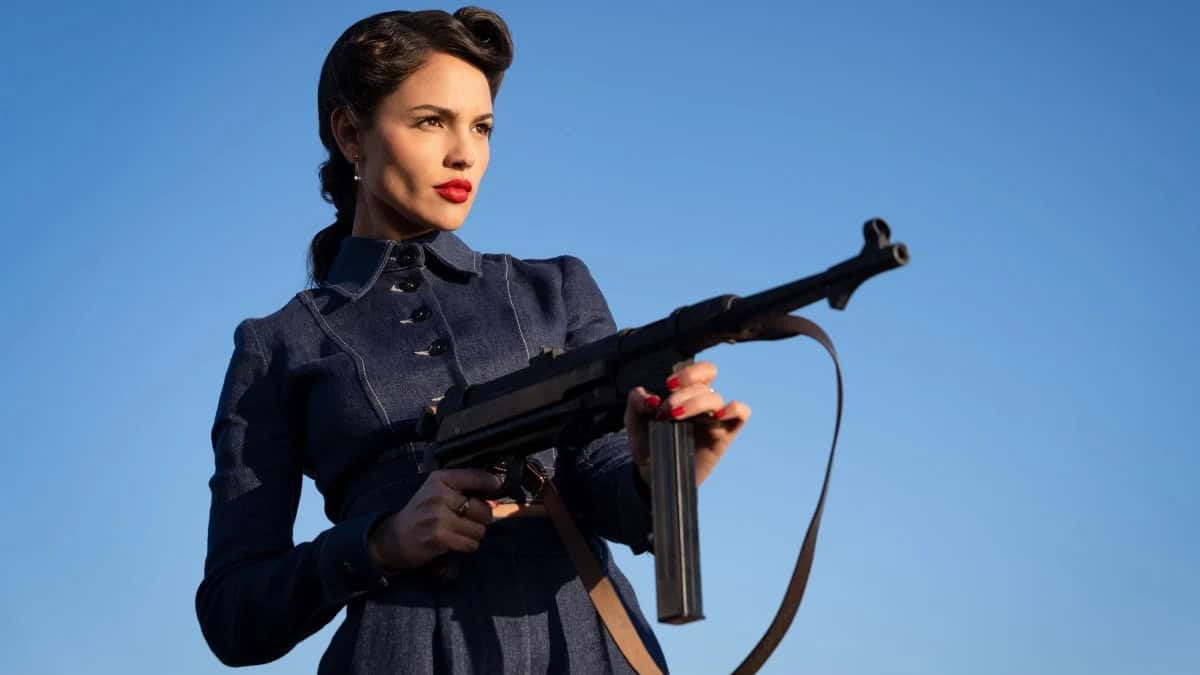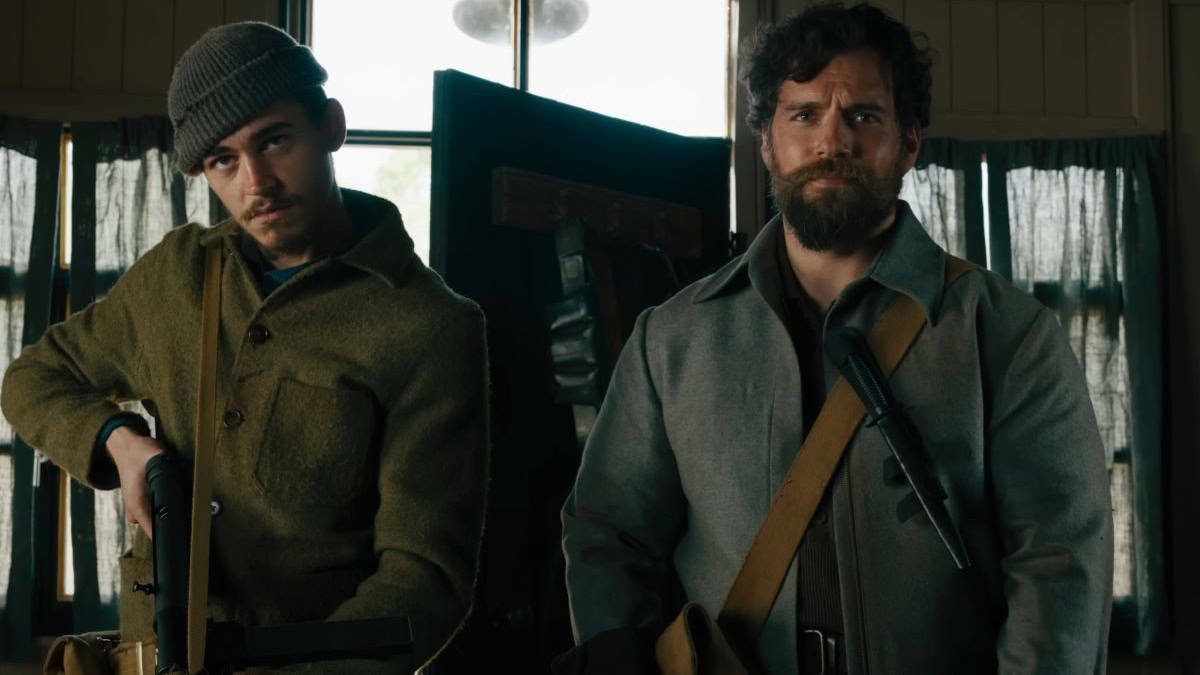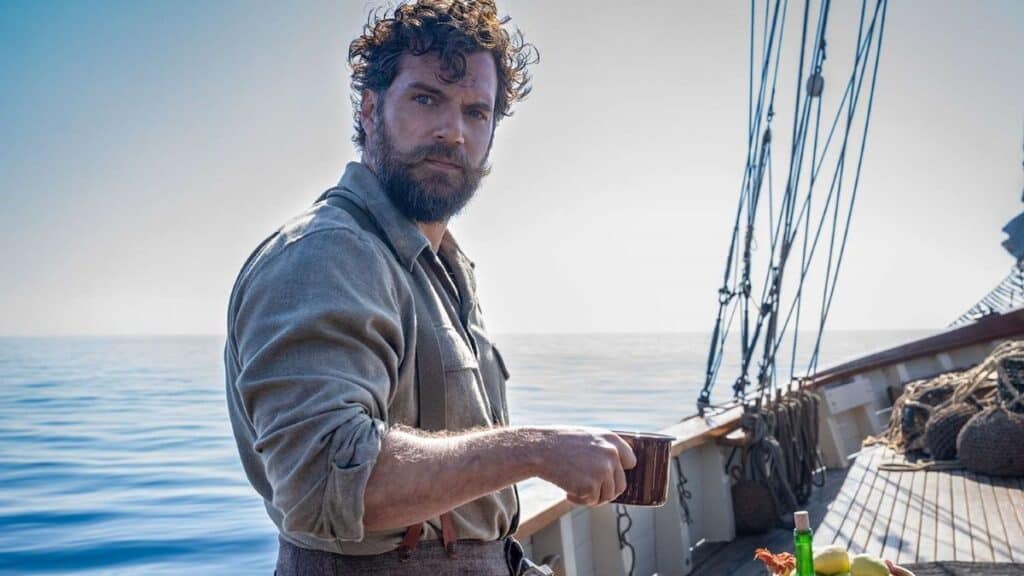Skip To...
Guy Ritchie’s The Ministry of Ungentlemanly Warfare does exactly what it says on the tin. You know whether you’ll like this movie based on its trailer. There are no tricks up its sleeve, but its execution carries the project. Henry Cavill and his team bring a comedic rush of violence within a straightforward narrative and a smirking sense of humor. While Ministry is breaking no new ground, it delivers a lot of fun for the right audience.
Guy Ritchie is the living embodiment of the word “bloke.” Guy Ritchie is like the smartest guy you can find housing a pint at your local pub. The auteur’s unique aesthetic encourages roughly fifty more similar summations. Guy Ritchie recently graduated from directing stories about his childhood friends to adapting the lives and interests of their dads. In many ways, Ministry contains the generational DNA of his early work.
Getting the Team Together

The Ministry of Ungentlemanly Warfare tells the tale of the Special Operations Executive, an English irregular warfare organization from the 40s. As Churchill struggles to feed his people, the primary concern is German U-boats in the Atlantic. Cary Elwes’ Brigadier Gubbins and Freddy Fox’s Ian Fleming recruit Henry Cavill’s Major Gus March-Phillips from prison. Gus brings his favorite bloodthirsty maniacs into the fold. He’s got an amphibious demolitions expert (Henry Golding,) an Irish young ward (Hero Fiennes Tiffin,) and a Danish super-soldier (Alan Ritchson.) His plan involves rescuing his favorite idea man (Alex Pettyfer) from a German base. Together, they must destroy the Italian vessel providing critical supplies to U-boats. Hijinks ensue, though frustratingly hampered by the film’s modest budget.
The central team varies wildly. Henry Cavill is the unquestioned star of the show. His Major March-Phillips is entertainingly unhinged. The unfortunate star of Argylle has a knack for playing characters barely removed from Bond, making March-Phillips the ideal role. He swaggers about, bringing a casual charisma to his violence and silly jokes. Alan Ritchson plays his knife-wielding butcher like a chipper ten-year-old turned into a killing machine by a misplaced wish. He shoots, stabs, and bludgeons his way through roughly a thousand men with a smile on his face. Unfortunately, The Ministry of Ungentlemanly Warfare doesn’t give as much credit to the other guys. Golding’s explosives expert likes blowing things up and hates everything else. Pettyfer rarely says anything outside of planning monologues. Tiffin’s angry Irish teen feels like a missed opportunity. The team composition was critical here, but everyone could use one or two more character traits.
Battles Fought Over Drinks

While Cavill and the boys do their 40s-era Guy Ritchie routine, Ministry breaks out a slightly dated spy story. Inglorious Basterds is the obvious comparison point here. Tarantino’s 2009 classic is quintessentially American, allowing Ritchie some wiggle room, but he’s definitely borrowing notes from a much better film. Elza González and Babs Olusanmokun lead the B-plot, which plays much like Diane Kruger’s subplot in Basterds. While Marjorie Stewart and Mr. Heron enjoy a lot of screentime and take several important actions, they never amount to much. They feel like a distraction from the film’s slam-bang action tone. Tonal inconsistencies kept me at a strange distance from the movie’s sincerity. Basterds used violence-like punctuation, intentionally jarring the audience with sudden strikes. Ritchie is far less surgical with his shifts, creating some snags.
Your experience with The Ministry of Ungentlemanly Warfare will live or die on how funny you find its gags. The script drips snark from every line of dialogue. Characters refuse to take anything seriously. The woefully underused Ian Fleming introduces himself as “Fleming, Ian Fleming.” The biggest laughs in my screening came out during the action scenes. Ritchie has an eye for genuinely funny moments in overwhelming violence. I lost it during a scene depicting Tiffin’s character using a mounted gun to mow down Nazis as dozens pour out of one door like a fascist clown car. Alan Ritchson’s upper-body strength allows him to shoot arrows through men, leaving exit wounds. It’s reminiscent of John Wick‘s sense of excessive brutality as humor. The dialogue is more hit-or-miss, with several snarky one-liners that land with a thud. Its constant winking gets exhausting, but at least Cavill and Ritchson have fun.
The Ministry Rarely Gives Up

Without wishing to spoil, The Ministry of Ungentlemanly Warfare‘s ending is conclusive but not closed. Guy Ritchie played this game with his less-impressive 2023 offering, Operation Fortune: Ruse de Guerre, but with a guarantee of failure. Ritchie could revisit this concept, exploring other missions the SOE encountered during the war. That isn’t particularly necessary, and I don’t see a ton of support for the idea, but this film does leave the idea available. I wouldn’t go looking for a British military cinematic universe, but I think it’s worth noting the possibility of a follow-up.
The Ministry of Ungentlemanly Warfare is shockingly predictable. Unlike the title team, the film does exactly as expected, with very few surprises. Some of the jokes don’t work, many of the characters are underserved, and the gags nearly overstay their welcome, but those are speed bumps on an otherwise clear road. If you thought Inglorious Basterds was a little too talky or The Dirty Dozen wasn’t funny enough, Ministry is for you. Ungentlemanly Warfare delivers on its premise, and sometimes, that’s enough to get the job done.
Warning: Undefined array key "criteria_label_1" in /var/www/wp-content/plugins/smartmag-core/inc/reviews/module.php on line 122
The Ministry of Ungentlemanly Warfare
Guy Ritchie's latest action thriller delivers satisfying set pieces despite some major writing problems.
Pros
- Fun performances by Henry Cavill and Alan Ritchson
- Hilarious and cathartic action scenes
- The breezy pace keeps things enjoyable
Cons
- Several characters lack personality
- The sense of humor can become grating
- The budget constraints limit the entertainment







